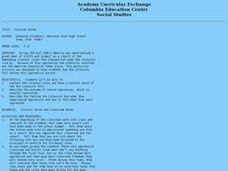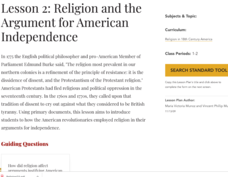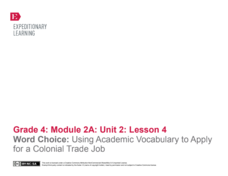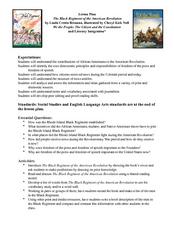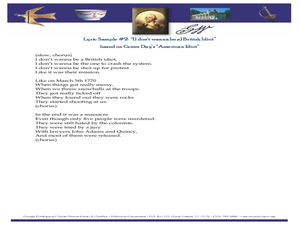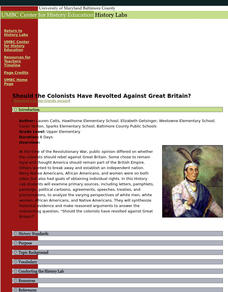Curated OER
American Colonial Life in the Late 1700s: Distant Cousins
Students research how early colonists lived. They investigate late 17th century colonist's lives from Massachusetts and Delaware. Using their research, students write historical fiction in the form of friendly letters between the two...
Curated OER
American Revolution Simulation
Middle schoolers explore the grievances of the American colonists. They relate to that which is held most dearly i.e. life, liberty and the pursuit of happiness.
Curated OER
Colonial Rules
How did Colonists react to British rule prior to the American Revolution? Give your high schoolers a taste of oppression with this role-play activity, then let them come up with a revolution of their own. This excercise is intended to...
Curated OER
Colonial Founders
Who were the founding fathers of the American Colonies? Engage in online activities, Internet research, and focused writing to find out. Students choose one colonial founder, conduct biographical research on the person, and take a quiz...
Jamestown-Yorktown Foundation
Why Did Some Colonial Virginians Continue to Support the King?
Not all colonials supported the American Revolution. A resource from the American Revolution Museum at Yorktown ask young historians to investigate the reasons why some colonial Virginians were loyalist and continued to support King...
Curated OER
Colonial Identity
Young scholars research and discuss the origins of the American colonies and explore how colonists were still influenced by English culture. As a follow-up project, students produce a portrait of an individual.
National Endowment for the Humanities
Lesson 2: Religion and the Argument for American Independence
Young scholars examine how religion affected arguments justifying American independence. They read and analyze primary source documents, and write an essay analyzing how Americans used religious arguments to justify revolution against a...
Curated OER
Modern Interpretations
To conclude an eight-lesson study of the events that occurred in the early colonial period in Deerfield, Massachussetss, class members evaluate the point of view and bias found in late 19th and early 20th century retellings.
EngageNY
Word Choice: Using Academic Vocabulary to Apply for a Colonial Trade Job
Scholars reflect upon colonial jobs such as a blacksmith, cooper, shoemaker, etc. Together, the class writes a job application as a practice for working independently. Learners employ their experience in writing a job application for a...
US House of Representatives
Hispanic Americans in Congress During the Age of U.S. Colonialism and Global Expansion, 1898–1945
To be Puerto Rican, in the words of one politician, is to be "foreign in a domestic sense." Young historians consider the American role in colonialism and its impacts on Hispanic Americans through the first part of the twentieth century...
Curated OER
Colonial Trades and Apprenticeships
Students examine and analyze culturally significant objects from colonial Boston. They construct a story around the life and work of Nathaniel Hurd from a list of keywords excerpted from a passage about Nathaniel Hurd. In addition, they...
EngageNY
Taking Notes Using a Graphic Organizer: Inferring About Work and Play in Colonial America
What was life like in colonial America? Follow this lesson and your pupils will find out what people in colonial times did for work and for fun. Ask learners to compare and contrast the two texts and explain what the reading helped them...
EngageNY
Taking Notes Using a Graphic Organizer: Inferring About the Importance of Religion in Colonial America
Improve class understanding of colonial times by reading an informational text and filling out the accompanying graphic organizer. Class members work with a partner to read, take notes, make inferences, and synthesize information.The...
Curated OER
Interpreting Foundation Documents of the American Republic
Explore early American documents that qualify as primary sources. Tenth and eleventh graders use the provided worksheets to analyze the texts of the Articles of Association, the Declaration of Independence, the Articles of Confederation,...
EngageNY
End of Unit 1 Assessment: Inferring and Synthesizing (From Two Texts) About Life in Colonial America
Close your colonial America unit with a performance-based assessment. Class members will show their proficiency in several skills including using details to back up inferences, determining the meaning of words in context,...
Curated OER
We the People: The Citizen and the Constitution: The American Revolution
The contributions of African-Americans to the American Revolution are the focus of this Social Studies and language arts lesson plan. After reading and discussing Linda Crotta Brennan’s The Black Regiment of the American Revolution,...
Curated OER
The American War for Independence
High schoolers complete a unit of lessons that examine the goals of the Americans during the Revolutionary War. They explore an online interactive map of major campaigns, read and analyze primary source documents, and analyze diplomatic...
Curated OER
Creating a Cartoon of the Philippine-American War
During the Industrial and commercial expansion of the United States, war broke out between America and the Philippines. Explore conflict, American Imperialism, and political cartoons with this creative project. Learners view the film,...
Roy Rosenzweig Center for History and New Media
Differences Among Colonial Regions
Classes look at and analyze primary source images to explore the differences between the colonial regions during the Revolutionary era. They break into groups to tackle each region and then present their findings to the class. A final...
Curated OER
American Colonists Protest Song
Middle schoolers explore the role of protest songs. In this early American history lesson plan, students research the acts passed by the British that angered colonists. Middle schoolers then listen to protest songs from contemporary...
National Endowment for the Humanities
Empire and Identity in the American Colonies
The American Revolution was born out of a European conflict that spilled over into North America—and the documents prove it! Using primary sources from the era of the French and Indian War, including British plans to try to unite its...
Curated OER
Causes of the American Revolution
Students recognize the taxation of the American colonists by the British led to the revolution. They participate in or analyze a performance of an 18th-century song and then discuss its meaning and craft.
Curated OER
Colonial New York Slave Codes: Law and Order
Build a historical perspective from four different points of view. Young historians take on the role of a slave-owning white person, non-slave owning white person, slave, or free African-American person and imagine what life would be...
Center for History Education
Should the Colonists Have Revolted Against Great Britain?
Should the Americans have taken the plunge and revolted against Great Britain? Using documents, including the famed Common Sense and a Loyalist response, pupils conduct a lengthy investigation of the question. The interesting resource...


